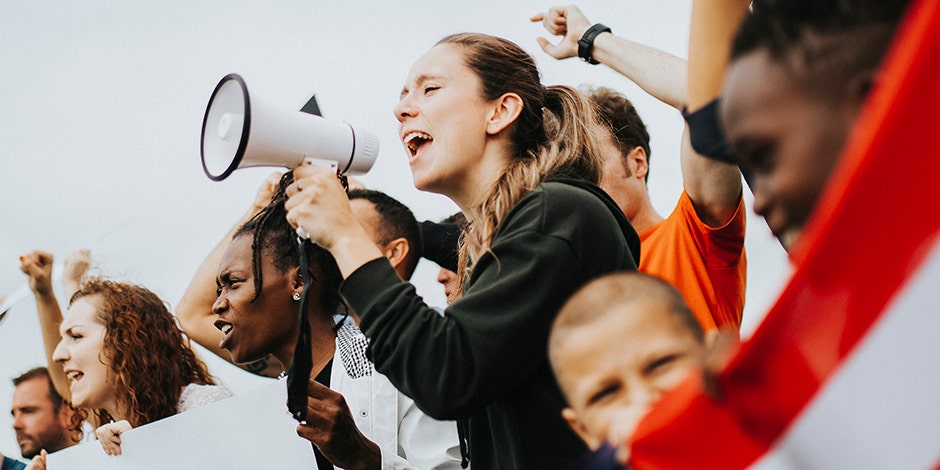Saying ‘I Have Black Friends’ Doesn't Help The Fight Against Racism
How it feels to watch your non-black friends stay silent in the fight against racism.
 rawpixel / 123RF
rawpixel / 123RF The default statement of being called a racist is to say, “I have black friends,” but quite frankly, that response doesn't do anything to prove you are not racist. Instead, a good response to that type of accusation would be to donate, spread awareness and protest when injustices happen with the black community.
It is unethical and disgusting to use your black friend as proof you aren’t racist, and it doesn't help or support the fight against racism. What makes you anti-racist is what you do support racial equality, not the friendships you have.
Ask yourself: outside of the few black people you know, “what you do for the black community?” If it’s nothing that means you are not an active ally against racism.
I define racism as the systematic oppression of people of color (POC) based on a differing race’s need to be superior.
The majority of racism is not overt, it’s in the little things. Racism is the denial that racism still exists. Racism is the failure to recognize white privilege. Racism is not supporting the Black Lives Matter movement. Racism is the stereotype that hurts the growth of POC. Racism is the prejudiced beliefs that get POC racially profiled. Racism is the disproportionate amount of punishment POC endure.
Racism is silence on racial injustices.
Having black friends does not make you anti-racist. Having a black significant other does not make you anti-racist. Having a bi-racial child does not make you anti-racist, either. Only your actions determine whether or not you are racist.
Imagine how heartbreaking it is for me and other black people who love people outside of our race to watch our friends remain silent. It’s a slap in our face and makes us feel as though you don’t truly care. If you truly cared about us, you’d care about what happens to our people.
Some black people may not say anything about how your silence is affecting them, but I promise you ... we are paying attention. Just as your silence is heard, so is what you say.
Friends are supposed to have each other's backs and support one another — no matter what. That means from everything from breakups to times of racial injustices. Even though you will never be black, your solidarity expresses your love and loyalty to your black friends.
If you truly support and love your black friend you will not be silent on black issues. You find them too horrific not to.
RELATED: What Is It Going To Take For Black Lives To Finally Matter In America?
You may argue that your friend isn’t dead or getting abused — but they very well could be. What if I was your black friend and the next George Floyd, Amhud Aubrey, Breonna Taylor, or countless other black victims who died at the hand of racists?
Would you speak up after it’s too late and they're in the grave? Does the tragedy have to hit home for you to feel affected? Would the discomfort of acknowledging your white privilege and the harsh realities of the black experience in America be too much to bear as opposed to allowing your friend to live in oppression?
In light of recent events, I’ve discovered that some of my friends are racist, and that really hurt me. The sad thing is, I’m not the only POC who has, either. Many of us are in disbelief about what our non-black friends are saying — and not saying — about racism.
Instead of seeking to understand why Black people and other supporters of the movement are protesting, rioting and looting, some people seek to condemn them. They also fail to acknowledge the countless black lives that have been lost to police brutality, where the victim did not get any justice.
I don’t condemn or condone the violence that is a direct result of a lifetime of systematic oppression and struggle experienced by black people. Even as a black woman, I don’t feel I have room to judge. I acknowledge many black people have endured way more than me, especially black people who survived slavery or lived through segregation.
What I do know is that people who are not black have no right to condemn it. You cannot truly judge the actions of the oppressed unless you have lived through oppression yourself.
Historically speaking, when the oppressed are outraged they become violent because the system has failed to serve and protect them. All the violence stems from racism — so if we end racism, we end the violence.
I know many non-black people who are uncomfortable talking about racism. To be silent about the issue of race is to side with the oppressor — and, in turn, back-stab the black friends you claim to love.
Growth never takes place in comfort, so step out of your comfort zone, and speak up for your friends of color. Proudly say black lives matter.
Saying black lives matter does not negate that the lives of all living beings matter. It simply highlights the importance of standing up for the most attacked race.
Black and white people do not face the same daily struggles, even if they share the same tax bracket. To say “all lives matter” instead of black lives matter is racist. It shows the user is has failed to acknowledge racism and oblivious to the fact black people are the main individuals being killed and abused by police brutality.
If you want to know how your black friend feels about your silence, it’s plain and simple. They feel betrayed.
Tamara Sanon is a writer who covers astrology, spirituality, love and relationship topics.

